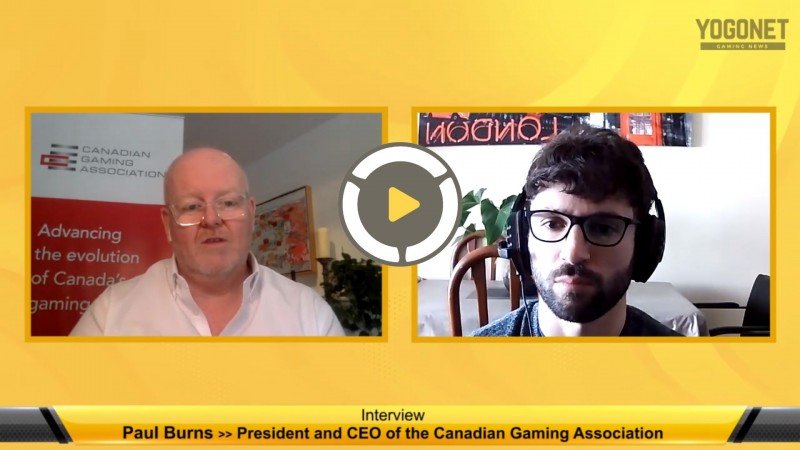Legal sports betting in Canada: "Now everybody’s watching the province of Ontario"

On June 22, Canada's Senate gave final approval to Bill C-218, which amends Criminal Code provisions around gambling on single sports games, currently illegal except for horse racing. The government will now decide on a date when the legalization of single-game sports betting will take effect following the required Royal Assent.
The Canadian Gaming Association has been working to legalize single-event sports betting for more than 10 years, which saw three previous attempts fail. The trade body's President and CEO, Paul Burns, spoke with Yogonet in a video interview and praised the bill passage. "Now it’s up to the provinces to begin to decide how they’re going to offer it, when, what it’s going to look like, and some of that work has begun already and underway," he said.
When asked about the key for the legislation to succeed this time, he said there were a number of factors this time. "We’ve had a wonderful coalition of organizations that have supported this bill. From the amateur sport community like Canada Soccer, the Canadian Olympic Committee, the International Olympic Committee, but also organized labor and business organizations, communities, have all said ‘Please get this done,' Burns said. "But the big one this time too was the professional sports leagues in North America, all back the bill. So there was really nobody left on the other side, there was nobody saying don’t do this."
He added that the pandemic also played a significant role, with the casino gaming industry in the country just starting to reopen in some places since March 2020. B.C. casinos are scheduled for July 1, and other provinces have had limited openings with very restricted capacities. Starting by mid-June some provinces began to reopen at "very good capacity levels, it’s going to grow over the next couple of months, so they’ll be getting closer back to normal. So having this product soon to offer is going to be really key for them too," adding pressure on the provinces as the land-based casinos really want to be able to have a sportsbook, especially in time for the fall sports season in North America.
As for potential timelines for single-game sports betting market launch, Burns noted British Columbia Lottery Corporation's announced plans be up and running in just weeks. "They have a very robust online platform that the provincial lottery corporation offers, they have good sports offering through it, and they expect to be able to make the changes necessary in a matter of weeks. The regulators across the country have been working on regulatory frameworks for sports betting for a number of months now." He believes there will be other lottery corporations to follow BCLC's lead, and in some jurisdictions, it may be initially offered only through the lottery corporation platforms. However, some provinces still have a road ahead before launch. For instance, the Saskatchewan Indian Gaming Authority (SIGA), which operates six casinos in the province, has been given the mandate to run online gaming and sports betting for the whole province, so they’re starting to build out their offering now, he said.
But Burns noted that everybody’s watching the province of Ontario, where he sees a "neat opportunity." Late last year, the provincial government started the process to create a regulated environment marketplace for online gaming, with an open licensing market. "And that’s unique to North America, for sports and online gaming it’s going to be a very interesting and competitive market," he underlined, adding that with almost 15 million people, Ontario is the biggest province in the country, and about the fifth-biggest market in North America as a jurisdiction. "So, it’s bigger than New Jersey in terms of population, it’s bigger than Illinois in terms of population, so it provides a potential for a really robust market with lots of competition and that’s the province that’s getting most of the interest at this point."
Said process is currently in a consultation phase in Ontario, and Burns expects to see details about this new market by September, when applications for licensing would be opening, and the market is expected to launch before the end of 2021. "Obviously, the casinos in Ontario don’t want to wait until the end of the year, and hopefully don’t have to. We’re hoping that they can have their sportsbooks operational in their casino environment by Labour Day weekend in early September," he said. "They’re working very very hard to make sure it’s competitive from a tax point of view."
The province of Alberta is also analyzing a possible model, according to CGA CEO. They launched their online platform earlier this year and plan to add sports to it, but they’re also looking at their casino market and considering allowing casinos to partner with sportsbooks for retail, and possibly with a mobile option, "and they’ve done some work to investigate that. So we’re waiting to see what that’s going to look like."
When asked about market size, Burns said there are a lot of different estimates and it’s hard to say given it will look very different in every jurisdiction, but for reference, he noted that there are about four and a half billion dollars wagered in total handle via offshore online sportsbooks. "I suspect we’ll see some of that start to move back in, especially with Ontario creating a licensing regime where a lot of these sites now can be licensed and do the revenue share with the government," he said. "Some are estimating the first year somewhere between 5 and 7 billion dollars in handle. I’ve seen estimates in five years as high as 28 billion dollars. I think that’s aggressive potentially, given I don’t think we’re going to be a completely open competitive market from coast to coast, so I think that somewhere in the 10 to 15 billion dollar range within five years in total handle is probably achievable." However, he said it is difficult to estimate the market size because, even though the Canadians do like to bet on sports, they have never had really a lot of choice when it comes to sports betting options and new products.
Furthermore, Burns highlighted that Canada's sports betting is a really diverse market, where popular sports for wagering go beyond the major North American leagues, as there are a lot of cricket fans, rugby and other professional sports. "We want to make sure that there's a marketplace where everybody can embrace live in-game wagering, betting on esports, all of those things, we want to make sure that the regulators are putting provisions in, to make sure those products can be offered too, we’re not trying to leave anything behind at this point, and make sure that it’s really a robust offering from coast to coast as best as possible."
Moreover, the Canadian Gaming Association has been working on cashless wagering standards for casino operators, and given that cashless option inside gaming floors is really taking off, Burns said they are seeing some jurisdictions in Western Canada look at it "much more thoroughly and investigating the products from the suppliers that are there." "I don’t think cash is ever going to disappear from the casino, and I tell people that all the time, it’ll become an option along with many others inside the casino environment. It’s a customer service driven business and the operators are listening to what their customers are saying and they’re asking those questions, can I tap with my phone on this payment here and here, and they don’t have that option but they’re hearing it and they want to respond to it. So I think we’re going to see a lot of movement on this, in the next 12 months probably, I think we’re going to start to see some of those options appear in the casino environment whether it's open payment systems or using player cards that are loadable with cash. All of those options I think will be available soon. So we’re grateful. I know a number of organizations have looked at our standards and started to apply them to their businesses."
Finally, Burns addressed the increasing casino reopening in the country. "We’re grateful now that we’re seeing the government is considering more robust occupancy levels. In British Columbia I think 65% of the gaming positions will be open when they reopen next week (July 1). It's a great level to build from. In Alberta it is the same, they’re very high. In Saskatchewan, where they opened with about a 150-person limit a couple of weeks ago, they’re on their way to basically having no capacity restrictions by the end of July," Burns noted.
Watch the full video interview on Yogonet's YouTube channel.

















































